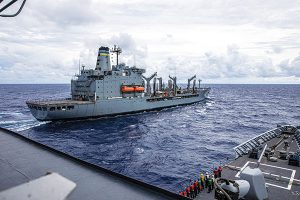Bloomberg
The top American naval commander in Asia criticized what he said were unsafe and provocative actions by Chinese warplanes, reiterating US complaints about behavior that officials argue could prompt a clash.
Vice Admiral Karl Thomas, commander of the US Navy’s Japan-based Seventh Fleet, expressed concern Tuesday about increasingly assertive efforts by the People’s Liberation Army to intercept US and allied military aircraft in the skies over the Pacific. He cited the firing of flares near planes and shortening the distance between aircraft as they pass as risky actions.
“There has been an increase in what we would consider unsafe, unprofessional or non-standard intercepts, and it’s not just United States aircraft, it’s also our allies and partners aircraft,†Thomas told reporters in Singapore, where the US was taking part in a regional training exercise. “It’s the provocative nature of the intercepts that’s got our attention.â€
The admiral’s warning comes as China ramps up drills and patrols around Taiwan in response to US House Speaker Nancy Pelosi’s visit to Taipei earlier this month. As part of its efforts to hit back at Washington over the trip, Beijing canceled three separate military-to-military talks intended to, among other things, set up systems to reduce the risk of escalation and miscalculation between the two nuclear powers.
While Thomas broadly characterized interactions with the PLA as “fairly professional,†he also said the Chinese military had become more aggressive during the US’s freedom-of-navigation operations or when allied aircraft approach areas that Beijing considers sensitive. Earlier this year, Australia and Canada similarly accused China of conducting dangerous intercepts of patrol aircraft during surveillance and sanctions-monitoring missions over the East and South China seas.
“If you’re trying to send a flare out of your plane to get somebody’s attention because maybe they’re going to go into your territorial airspace or something, that might be one thing, but if you’re operating in international airspace, that’s another thing,†Thomas said. “When you start doing things — eject things from your aircraft —you start crossing lines that are unacceptable, quite frankly.â€
While the Biden administration argues congressional trips including Pelosi’s have no bearing on the US’s 50-year-old agreement to cut formal ties with Taipei, Beijing increasingly sees them as a threat to its claims on Taiwan. Besides suspending some talks with the US, China responded to Pelosi’s trip by firing 11 missiles in to the seas around Taiwan and sanctioning the speaker.
China added seven Taiwan officials to a list of what it described as “die-hard†Taiwan independence supporters subject to sanctions, the official Xinhua News Agency said. They include Hsiao Bi-khim, Taiwan’s representative to the US; Wellington Koo, secretary-general of the National Security Council; and Tsai Chi-chang, deputy legislative speaker.
On Sunday, Senator Ed Markey, a Massachusetts Democrat, arrived in Taiwan as part of a five-member congressional group, prompting China to announce the fresh military patrols. Unlike earlier this month when China conducted live-fire exercises and likely fired ballistic missiles over Taiwan’s main island, Beijing didn’t immediately specify exclusion areas for commercial planes or ships to avoid.
“I know that the gorilla in the room is launching missiles over Taiwan,†Thomas said on Tuesday. “If we just allow that to happen, and we don’t contest that, that’ll become the next norm, and that’s not acceptable. That’s irresponsible.â€
 The Gulf Time Newspaper One of the finest business newspapers in the UAE brought to you by our professional writers and editors.
The Gulf Time Newspaper One of the finest business newspapers in the UAE brought to you by our professional writers and editors.
